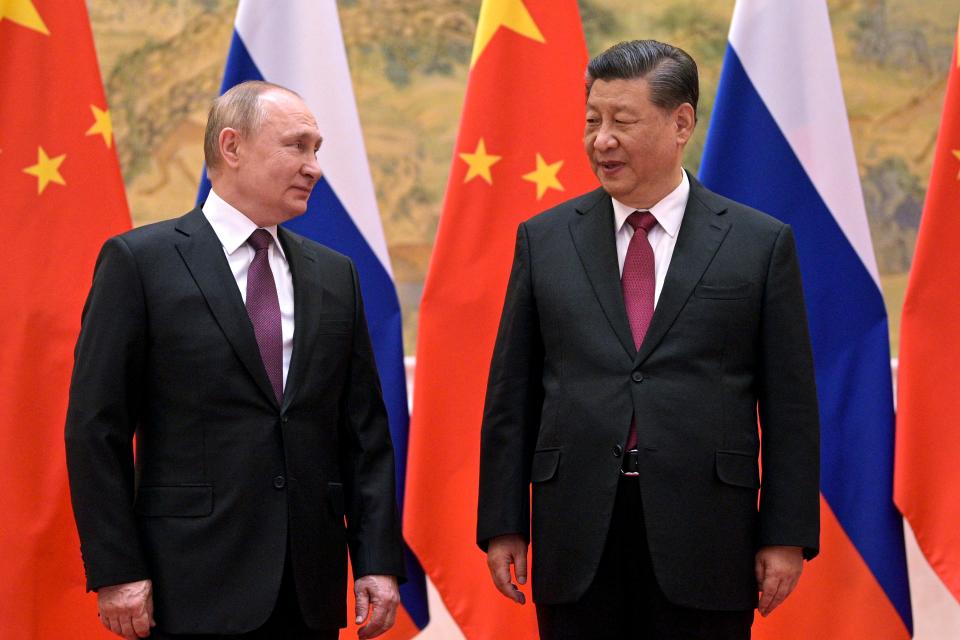OPINION: Is China winning the Ukraine war?
- Oops!Something went wrong.Please try again later.
- Oops!Something went wrong.Please try again later.

It was only a matter of time before China and Russia joined forces against America’s hegemony in the global system. For years now, Chinese President Xi Jinping and Russian President Vladimir Putin have been working to build an anti-U.S. partnership that's based on mutual grievance.
In a joint declaration of unity issued shortly before Russia’s invasion of Ukraine, Xi and Putin promised to place “no limits” on their countries’ cooperation against the U.S.-led world order. In addition to redefining established norms of democracy and human rights, the two presidents called for a United Nations-based multipolar global order – and also demanded a halt to further NATO enlargement and efforts by the United States to create new military alliances in Asia.
The Ukraine war is the first real test of the “no limits” partnership and Moscow has no reasons to complain. Despite its stated respect for national sovereignty and territorial integrity, China has failed to condemn the Ukraine war – and it has even supported Russia's justification for it.

Beijing has accused the U.S. of being the leading instigator for the invasion, and it has also suggested that Washington has escalated the ongoing military conflict well beyond the original American aim to protect Ukraine’s sovereignty and independence. In polls more Chinese support Russia than Ukraine. And Beijing has also sharply criticized the “illegal” Western sanctions against Russia.
But while there is no doubt about which side China is cheering for in the current war, Beijing is surely concerned that the Russian military has performed so poorly – particularly since the invasion of Ukraine was intended to be a quick and decisive victory for Russia. The fact is China needs a strong ally for an effective front against the duo's declared common enemy: the United States.
So how can Xi help his “best friend” Putin in the difficult circumstances Russia is facing today? It's clear that China is focusing on solely providing Russia with economic assistance; indeed Beijing has denied rumors that the Russians have asked for military equipment to support their invasion. And China has emerged as the ally capable of helping Russia withstand the vast financial and economic sanctions that it now faces – especially when it comes to energy exports, which are vital for Putin to sustain his war machine.
The U.S. government has threatened China with “secondary sanctions” if it helps Russia offset the effects of Western financial and trade sanctions. But Xi, who is running this year for an unprecedented third term as the Chinese Communist Party's boss, can't afford to look soft in responding to the West’s pressure. In addition, China – the world’s largest trading and creditor nation, and one with an attractively huge market – has been working hard to make its nation both blockade-proof and sanctions-proof.
For China, one of the main lessons of the Ukraine war is the pivotal importance of financial self-reliance. Beijing is already reassessing the risks of participating in the Western-controlled international financial system. And it is unlikely that the Chinese will repeat Russia’s astonishing mistake of holding half of its $630 billion foreign exchange reserves in Western banks, which gave the West an opportunity to freeze those assets. In a move to insulate top Chinese officials from the types of sanctions now being directed at Russia, Xi has just ordered them to divest their foreign-based assets.
After Ukraine, the next iteration of the great power rivalry is likely to revolve around Asia. A confrontation between the U.S. and China over Taiwan is one of the top risks of war around the world. While an invasion of Taiwan has been under consideration by Chinese military planners for decades, Xi's style of leadership over the past few years has caused observers to truly fear that an attack is increasingly likely. Xi sees a reclaimed Taiwan – by force, if necessary – as the potential crown jewel of his legacy in reviving China as a great power on the path to global dominance.
That said, however, the main lesson that China is likely taking from the Ukraine war is that the West is not quite as divided and toothless as Russia assumed it to be. And it's very possible that America's longstanding Taiwan policy of “strategic ambiguity” – a tactic that is considered outmoded by some foreign policy experts –may soon shift toward a clear policy to deter China.
Istvan Dobozi is a former lead economist at the World Bank, and led the organization's energy program in Ukraine. He resides in Sarasota.
This article originally appeared on Sarasota Herald-Tribune: It's China - not Russia - that may be winning the war in Ukraine

